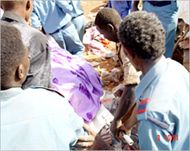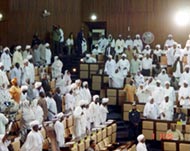Sudan’s leaders want aid not trials
The Sudanese government and southern rebels have told the UN that development aid should be the main priority rather than prosecuting war criminals.

Ali Usman Muhammad Taha, Sudan’s vice-president, and John Garang, leader of the Sudanese People’s Liberation Army (SPLA), were addressing the world body on Tuesday about the agreement they signed last month ending a 21-year civil war in the south of the sprawling East African state.
Taha, in charge of negotiations on Darfur in the country’s western region, and Garang, who will become a vice-president, presented political proposals meant to stop militias from killing, raping and robbing the Darfur people.
Garang also proposed a new force of some 15,000 to 30,000 troops to keep peace in Darfur – a third from the government, a third from his SPLA and the rest from the African Union (AU) and others.
Mutual feelings
All sides, including UN officials, exhibited frustration in the ongoing conflict with no agreed clear course of action.
 |
|
All sides expressed frustration at |
The 15-nation Security Council is currently debating sanctions against those responsible for the violence that has killed at least 70,000 people and made 2 million homeless.
The council is also considering trials for perpetrators of atrocities on a sealed list drawn up by a UN-appointed commission, which last week found evidence of heinous crimes in Darfur but stopped short of labelling the violence genocide.
Taha rejected any outside tribunal dealing with Sudanese citizens and said his government had its own commission that would implement recommendations of the UN inquiry.
No distractions
He said bringing the accused to justice “should not distract us from the need to realise peace first and to put an end to all hostilities”.
Garang said the militias, once armed by the government and known as Janjawid, needed to be punished – but only after peace was achieved.
Otherwise “that would be putting the cart before the horse, in which case both the cart and the horse would not move and they would go nowhere”, he said.
|
|
|
Sudanese groups signed a peace |
Both Taha and Garang pleaded with the council to push for international development aid as promised when a north-south peace agreement was signed. Some nations, including the US, have said the violence in Darfur had to end first.
Taha said the impoverished country should be free of any economic sanctions and that foreign debt should be completely written off.
Garang agreed, saying any lack of reconstruction help, in a country that has known only a few years of peace since independence, would be self defeating.
Uncontrollable situation
Jan Pronk, the UN envoy for Sudan, said the government was incapable of reining in the Janjawid, the Darfur rebels were making a power grab and the AU peacekeeping
force needed to be supplemented by a “third force”.
Pronk appealed to all parties, including the AU and members of the Security Council, “to find a creative way to expand the present third force into one which can stop all
attacks”.
Baba Gana Kingibe, the AU special representative in Sudan, said the number of troops was not the issue.
“So far, I have not found that the parties have demonstrated sufficient political will or commitment to finding a lasting solution to the crisis,” he said, adding that 3320 troops and police would be on the ground by mid-April.
After years of low-level conflict between nomads and farmers, armed rebels launched a revolt two years ago, in part over land and grazing rights. The government retaliated and armed the nomadic militias.
